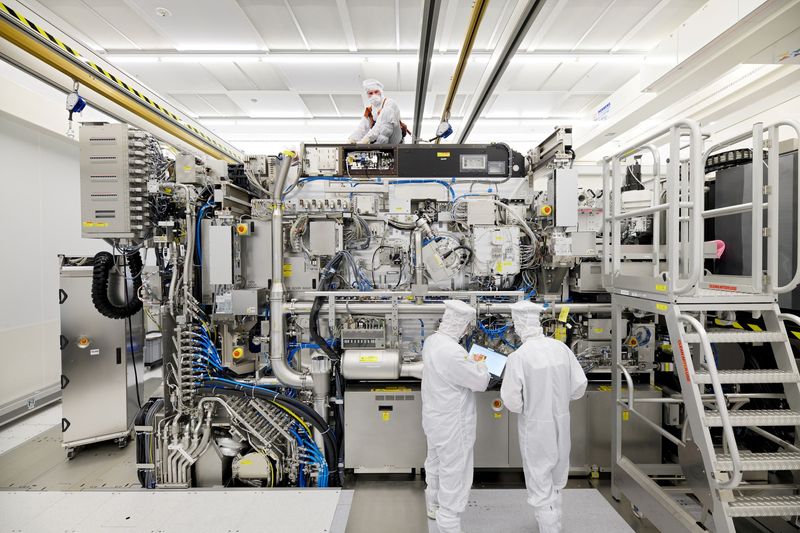By Toby Sterling and Nathan Vifflin
AMSTERDAM (Reuters) - ASML (AS:ASML), the largest supplier of equipment to computer chip makers, reported weaker than expected first-quarter new bookings on Wednesday, although sales to China held up despite U.S.-led restrictions.
Shares in Europe's biggest tech firm, which had risen 34% this year, were down 4.5% to 872.50 euros at 1240 GMT.
The Dutch group is seeing a lull in demand for its most advanced machines, but gearing up for a strong 2025 due to demand for AI and memory chips, including from top customer TSMC of Taiwan, which makes chips for Nvidia (NASDAQ:NVDA) and Apple (NASDAQ:AAPL).
ASML dominates the market for lithography systems, machines that can cost hundreds millions of euros each and use light beams to help create microscopic circuitry. It is set to benefit from new chip plants planned with support from governments in Taiwan, South Korea, Japan, and the United States.
New bookings in the first quarter were 3.6 billion euros ($3.8 billion), well below the 5.4 billion euros seen by analysts polled by Reuters.
Analysts and investors took that in their stride, noting that the many plants being built globally would need ASML equipment, while adding it would be a problem if new orders didn't come through in the rest of this year.
"Although disappointing we would not read too much into it as order intake is notoriously lumpy," said ING analyst Marc Hesselink.
ASML now also makes about 25% of earnings from servicing, maintenance and upgrades of its growing installed base of equipment.
In the first quarter, Chinese demand helped to support earnings.
CHINA RESTRICTIONS
The U.S. government has been seeking to undermine China's ability to make its own chips by restricting exports of advanced chipmaking equipment, aiming to curb Beijing's military capabilities in particular. China, meanwhile, is pursuing a multi-year programme to reduce its dependence on imported chips.
The result has been that Chinese chipmakers are flocking to buy older ASML equipment that does not face export restrictions, needed to make chips that go into products from refrigerators and automobiles to toys and smartphones.
Sales of ASML's lithography systems to customers in China made up a record 49% of the total in the first quarter, or around 2 billion euros, the company said in an investor presentation published alongside the earnings.
In 2023, China represented 29% of ASML sales, in part as customers there bought the company's mid-range equipment before new export restrictions came into full effect on Jan. 1, 2024.
From 2020-2023, China was ASML's third market after Taiwan and South Korea, and ahead of the United States.
ASML on Wednesday kept its 2024 financial forecasts unchanged, with sales seen flat from 2023's 27.6 billion euros.
Outgoing ASML CEO Peter Wennink said that, despite the weak bookings, the company still expected a stronger "second half of the year ... in line with the industry's continued recovery", describing 2024 overall as a "transition year".
Wennink, who is retiring, will be replaced by Christophe Fouquet at the company's annual meeting on April 24.
Han Dieperink, chief investment officer at investment firm Aureus, said he was not worried by the quarterly numbers, given ASML's market dominance and strong long-term growth outlook.
"You can't get around ASML. And that gives us also some sort of defensive qualities," he said. Aureus has 5-6% of its 2 billion euro equity portfolio in ASML.

ASML's first-quarter net income was 1.22 billion euros, down from 2.05 billion in the fourth quarter of 2023. Sales were 5.29 billion euros, down from 7.24 billion euros.
($1 = 0.9414 euros)